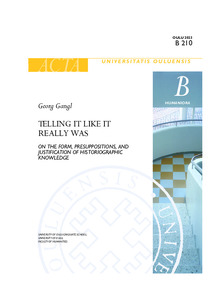Telling it like it really was : on the form, presuppositions, and justification of historiographic knowledge
Gangl, Georg (2023-10-27)
https://urn.fi/URN:ISBN:9789526238463
Kuvaus
Tiivistelmä
Abstract
This thesis is concerned with historiographic knowledge, with its form, presuppositions, and justification. In the articles that form its backbone I argue that historiographic knowledge often takes the form of causal narratives, and that hindsight is an essential epistemic asset in the forging of those narratives. The articles further argue that historiographic knowledge is best understood through informational epistemology and a coherentist understanding of epistemic justification. The process of justification of historiographic knowledge claims, however, is also an intersubjective process in which different disciplinary practices play an essential role.
The extended introduction of this thesis has three goals that come out of the articles: 1) to elucidate the nature and characteristics of the philosophy of scientific historiography; 2) to argue for an empirical turn in the discipline; and 3) to probe the relationship between historiography and other ways to relate to the past, and with that, the relationship between the philosophy of historiography and the theory of history. On the first issue, I argue for a broadly naturalist understanding of the discipline, and I define its main task as the philosophical reconstruction and explication of the scientific practices of (Rankean) historiography along with their limits. The determination of the reach and limits of these scientific practices is a fundamentally empirical task though, thus the call for an empirical turn. Having established the nature of scientific historiography, I ask what role a rational and truthful relation to the past should play in our individual lives and for society as a whole.
The goal of chapter III is to delineate the relationship between (scientific) historiography and politics, and to defend the discipline against politicist usurpations. For these reasons, I talk about some basic agreement among historians concerning politics and the limits of its influence on their discipline, just as much as I identify the positive influence that politics can have on historiography. The nature and justification of historiographic method is apolitical though; anyone of any political persuasion has good reasons to use those methods, if they want to produce knowledge of the past. The chapter closes with reflections on the (political) limits of historiographic reason.
Tiivistelmä
Tämä opinnäytetyö käsittelee historiografista tietoa, sen muotoa, oletuksia ja perusteluja. Historiografialla tarkoitetaan historian oppialaa mukaan lukien historiantutkimus ja -kirjoitus. Opinnäytetyön selkärangan muodostavissa artikkeleissa väitän, että historiografinen tieto on usein kausaalisten kertomusten muotoista ja että jälkikäteistarkastelu on episteemisesti hyödyllistä luotaessa narratiiveja. Ehdotan artikkeleissa, että historiografinen tieto on olemukseltaan informaatioepistemologian ja koherentistisen episteemisen oikeuttamisen kaltaista. Historiografisten tietovaatimusten perusteluprosessi on myös intersubjektiivinen prosessi, jossa erilaiset opilliset käytännöt ovat olennaisesti mukana.
Tämän opinnäytetyön laajennetulla johdannolla on kolme artikkeleista kumpuavaa tavoitetta: 1) selvittää tieteellisen historiografian filosofian luonnetta ja piirteitä; 2) argumentoida tieteenalan empiirisen käänteen puolesta; ja 3) tutkia historiografian suhdetta muihin tapoihin lähestyä menneisyyttä, ja sitä kautta tarkastella historianfilosofian ja historiateorian suhdetta. Puolustan laajasti ottaen naturalistista käsitystä historiografiasta. Tavoitteenani on (rankelaisen) tieteellisen historiografian käytäntöjen ja rajojen filosofinen eksplikaatio ja rekonstruointi. Kyseisten käytäntöjen rajojen määrittäminen on kuitenkin pohjimmiltaan empiirinen kysymys, joten se vaatii ”empiiristä käännettä” historianfilosofiassa. Hahmoteltuani tieteellisen historiografian perusluonteen, siirryn pohtimaan, mikä rooli sillä tulisi olla niin laajemmin yhteiskunnan tasolla kuin yksilön elämässäkin.
Kolmannen luvun tavoitteena on kuvata ja rajata tieteellisen historiografian ja politiikan keskinäistä suhdetta sekä puolustaa historiografian opillista olemusta alan politisointia vastaan. Tarkastelen historioitsijoiden yhteisymmärrystä koskien politiikkaa ja sen vaikutusta historian oppialaan. Osoitan, että politiikalla voi olla positiivisiakin vaikutuksia historiografiaan. Historiografisen metodin perusluonne ja oikeutus ovat kuitenkin epäpoliittisia. Tiedon tuottaminen historiografisia menetelmiä käyttäen on perusteltua riippumatta siitä millaisia poliittisia vakaumuksia tiedon tuottajalla itsellään on. Luku päättyy pohdintaan historiografisen järkeilyn (poliittisista) rajoista.
Original papers
Original papers are not included in the electronic version of the dissertation.
Gangl, G. (2019). Narrative explanations: The case for causality. Journal of the Philosophy of History, 15(2), 157–181. https://doi.org/10.1163/18722636-12341425
Gangl, G. (2021). The essential tension: Historical knowledge between past and present. History and Theory, 60(3), 513–533. https://doi.org/10.1111/hith.12226
Gangl, G. (2021). Historia magistra vitae? The role of historiography in culture and politics. Faravid : Journal for Historical and Archaeological Studies, 52(3), 103–122.
Gangl. G. (2023). Misunderstandings. Kalle Pihlainen’s the work of history. Constructivism and the politics of the past. Manuscript in preparation.
Osajulkaisut
Osajulkaisut eivät sisälly väitöskirjan elektroniseen versioon.
Gangl, G. (2019). Narrative explanations: The case for causality. Journal of the Philosophy of History, 15(2), 157–181. https://doi.org/10.1163/18722636-12341425
Gangl, G. (2021). The essential tension: Historical knowledge between past and present. History and Theory, 60(3), 513–533. https://doi.org/10.1111/hith.12226
Gangl, G. (2021). Historia magistra vitae? The role of historiography in culture and politics. Faravid : Journal for Historical and Archaeological Studies, 52(3), 103–122.
Gangl. G. (2023). Misunderstandings. Kalle Pihlainen’s the work of history. Constructivism and the politics of the past. Manuscript in preparation.
Kokoelmat
- Avoin saatavuus [32227]
